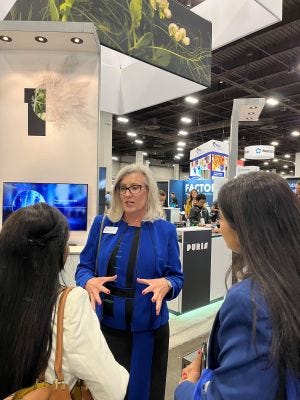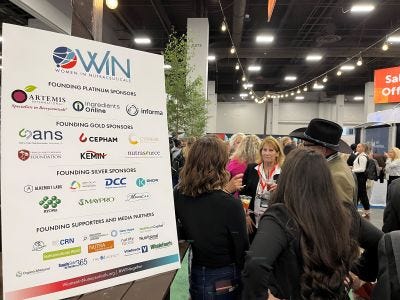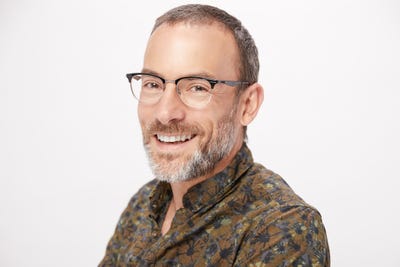Women in Nutraceuticals is a new natural products industry organization hoping to increase female representation from the C-suite to science—both conducting clinical research and as study subjects.
November 28, 2022

A 30-year veteran journalist of the natural products industry, Heather Granato is no stranger to talking about women in nutraceuticals. But last year, after chairing a roundtable discussion at Vitafoods Europe 2021 on the topic of women in leadership—followed by a Nutrition Capital Network (NCN) panel discussion at SupplySide West—she realized talking wasn’t enough.
“There was a lot of conversation, but there was very little in terms of goal setting and trying to actually make tangible change on the ground,” explained Granato, VP of partnerships and sustainability with Informa Markets, food, EMEA. “After both of these events, I was talking with other folks who were there. We all said, ‘This seems like the right time. We should be doing more than just having conversations.’”
This group of like-minded folks put their heads together, and in March of 2022, Women in Nutraceuticals (WIN) was born. The vision of this nonprofit is to achieve economic and societal equity to change the global nutraceutical industry. Its mission is to empower women in nutraceuticals to unlock their personal and professional potential.
“This is not a women's organization,” emphasized Granato, who serves as the organization’s president and previously was VP of content at the Health and Nutrition group of Informa Markets, which publishes Natural Products Insider. “It’s not about more women and fewer men. This is about finding parity because it supports the growth of business and it supports the growth of the industry.”
WIN spent the next few months working out logistics such as membership, sponsorship and outreach communications, then soft launched at July’s Nutrition Business Journal (NBJ) Summit 2022. In November, the group formally launched at this year’s SupplySide West in Las Vegas. Events included a networking reception, panel discussion, and the announcement that WIN commissioned a benchmark survey to measure representation in C-suite and other top leadership positions in the nutraceutical industry.

According to the McKinsey & Co. report, “Women in the Workplace 2022,” women in corporate America continue to be underrepresented in leadership. The report pinpointed this lack of advancement to a “broken rung” in the leadership pipeline, with few women promoted from entry-level roles to manager positions. For the past eight years, for every 100 men promoted from entry level to manager, only 87 women receive promotions, the report found. By the time it gets to the C-suite, 74% of the roles are filled by men, 26% by women.
How women in the nutraceutical industry stand compared to these numbers isn’t clear. Thus, the benchmark survey, which will be conducted by NEXT, a division of Informa, across the U.S., as well as Europe and Asia.
“It’ll be amazing to see how we compare to other industries,” said Karen Todd, WIN’s chairperson, a registered dietitian and VP of global marketing at Kyowa Hakko. “We’ll also have a baseline to compare to. We’ll have KPIs [key performance indicators] throughout the year to measure how we’re doing, if we’re reaching our goals.”
Another goal of WIN is to increase the role of women in scientific studies, both as researchers and subjects. “We see a lot of first authors,” Karen Hecht, Ph.D., pointed out at WIN’s “Inspiration from the research lab” panel discussion at SupplySide West, “but less last authors.”
In scientific authorship, the first author in a research study is typically the person who’s done most of the work, including writing the manuscript, while the last author plays a senior or supervisory role (Indian J Plast Surg. 2010 Jul;43[2]:233-234).
Women are also underrepresented as subjects. “Historically, research has been conducted on men because of menstrual cycles and various other factors like pregnancy and menopause,” Todd explained. “Men are more straightforward.”
However, to borrow the catchphrase of renown exercise physiologist Stacy Sims, Ph.D., “Women are not small men.” A recent audit in the journal Nutrients comparing representation of female versus male athletes in sports supplement research showed that when it came to research regarding performance outcomes, only 16% of participants were women (2022;14[5]:953). Health-focus studies did marginally better with 35% female representation.
This example merely touches on a small sector of the nutraceutical landscape, but it makes the point. “We know there’s a difference in metabolism,” Hecht insisted. “This one-size-fits-all approach has been shown not to work.”
According to Granato, it’s also problematic from a customer perspective. “Consumers in the nutraceutical industry want to see research on study populations similar to them,” she contended, “where we're not making leaps.”
“In many cases, perhaps the ingredients do have similar effects in men and women. But it's also possible that it doesn't work that way,” Granato cautioned. “Representative research will allow us to speak more confidently about the positive effects that our products have in human health. When you have more people in leadership who see this as a priority, who will put funding in, then the messages that go out also align with the consumers that we want to reach.”
If industry reception serves as an indicator, nutraceutical companies are ready for WIN’s winds of change. The organization has attracted a solid list of sponsors, including Artemis International and Informa at the platinum level, as well as a quickly growing member base.

Todd added, “The reason we want women leaders in these organizations is not because it looks good. It’s not just a checked box. Organizations that have women in leadership, in C-suite positions, they’re more innovative; they’re better regarded; and, in the end, they’re more profitable,” she opined.
Beyond the balance sheet, Granato also hopes WIN will contribute to the larger JEDI (justice, equity, diversion and inclusion) conversation. “I do believe that there are lots of movements happening under the broad JEDI and inclusion discussions, but that can be overwhelming,” she suggested. “I thought it could be useful to carve out a very specific angle and see if we could move the needle starting in one very slim portion—then perhaps get broader from there.”
About the Author(s)
You May Also Like






.png?width=800&auto=webp&quality=80&disable=upscale)